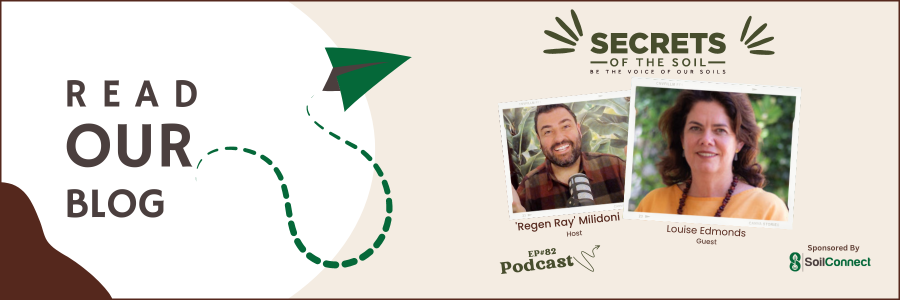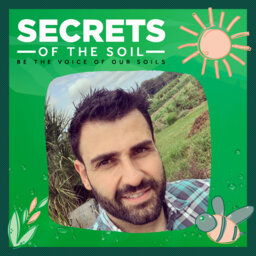🌱 Exciting conversation alert! Just wrapped up a thought-provoking episode of “Secrets of the Soil” with the incredible Louise Edmonds from Carbon Sync. We delved into the imperative mission of ecosystem restoration, carbon removal, and the transformative power of regenerative agriculture.
🔍 Key Takeaways:
1️⃣ Carbon Sync’s Approach: Focused on restoring ecosystems from soil upward, Louise shared insights into the community-driven, heart-centered model of Carbon Sync. They work closely with farmers in Western Australia to promote regenerative practices and cultivate a culture of learning and sharing experiences.
2️⃣ Financial Opportunities: More than just a buzzword, regenerative agriculture presents tangible financial benefits for early adopters. We discussed the potential shift from a “carrot to stick” approach and the importance of seizing opportunities in carbon and biodiversity markets.
3️⃣ Soil as the Heart of Regeneration: Louise’s passion for soil and regenerative agriculture was ignited by the work of Dr. Vandana Shiva and the repercussions of the Green Revolution. We explored the lasting effects of synthetic inputs on soil and communities, the link between soil and gut health, and the need for rewarding farmers for transitioning to regenerative practices.
Tune in to the full episode for a deep dive into the world of soil, sustainable farming, and the transformative potential of regenerative agriculture. The path to a healthier planet starts from the ground up! 🌍🌾
Who is Louise Edmonds
Louise is an innovator and entrepreneur in regenerative agriculture and the emerging carbon and environmental markets. Throughout her career, she’s had a sole, driving vision: to restore the health of agricultural ecosystems.
As Founder & CEO of Carbon Sync, Louise is a seasoned expert in regenerative agriculture. She brings together the best people and technology to create robust, decades-long programs that help farmers implement management practices to enhance the health of their farm ecosystem.
Louise believes the stability of the climate can be achieved through the restoration of our soils.https://carbonsync.com.au/the-carbon-sync-team/The relationship between soil health and climate stability. Fixing soil does not require the agreement of 195 nation-states.

In the recent episode of “Secrets of the Soil”, Louise Edmonds, co-founder of Carbon Sync, joined host ‘Regen Ray’ Milidoni to unravel the intricacies of regenerative agriculture and ecosystem restoration, shedding light on the pivotal role of carbon in these processes. This blog post delves deeper into the key insights from their conversation, providing a comprehensive overview of the challenges, opportunities, and the transformative power of regenerative agriculture.
Restoring Ecosystems from the Soil Upward:
Carbon Sync’s approach focuses on restoring ecosystems starting from the soil and progressing through the trophic levels of organisms within farming ecosystems. The name “Carbon Sync” embodies the intricate process of ecosystem restoration, emphasizing holistic integration and transformation of farming systems. Working predominantly in the wheat belt of Western Australia, Carbon Sync collaborates with farmers to support cropping and grazing enterprises, placing significant emphasis on community engagement, shared learning, and fostering a culture of collaboration.
Holistic Transformation and Cultural Shift:
Unlike traditional business models, Carbon Sync places strong emphasis on people, community, and cultural transformation, recognizing the need for hearts and minds-based strategies. Louise Edmonds highlighted the challenges of funding such transformative work and underscored the significance of using carbon as an indicator of success in fostering support for regenerative practices among farmers. This underscores the importance of a more inclusive and value-driven approach, aligning with the principles of regenerative agriculture that prioritize the health of farm ecosystems, family well-being, and community health.
Regenerative Agriculture and Financial Incentives:
The conversation emphasized the financial opportunities for farmers participating in carbon and biodiversity markets. By connecting the adoption of regenerative practices to tangible financial benefits, the initiative seeks to encourage early adoption, given the changing landscape and potential loss of incentives. The benefits of being an early adopter in the regenerative agriculture space were underscored, as well as the need for a shift from a punitive to a supportive approach in government policies towards farmers.
Challenges and Transitioning to Regenerative Practices:
The discussion highlighted notable challenges, including the financial hurdles faced by farmers in transitioning to regenerative practices, the influence of banks in land clearing, and the need for equitable rewards for farmers embracing regenerative agriculture. Moreover, the conversation shed light on the detrimental effects of synthetic fertilizers, pesticides, and herbicides on soil and communities, emphasizing the profound link between soil health and gut health.
Lessons from Ecofeminism and Soil Advocacy:
Louise Edmonds detailed how her journey into soil and regenerative agriculture was influenced by ecofeminist literature, particularly the work of Dr. Vandana Shiva, which exposed the adverse impacts of the Green Revolution. This historical context revealed the detrimental repercussions of repurposing war munitions into fertilizers, initially boosting crop yields but causing long-term damage to soil, water, and ecosystems. This underscores the imperative of understanding and rectifying the damaging impacts of past agricultural practices.
The insightful conversation between Louise Edmonds and ‘Regen Ray’ Milidoni encapsulated the transformative power of regenerative agriculture, the critical role of carbon in ecosystem restoration, and the imperative of addressing the financial, cultural, and ecological aspects of the transition. As we unearth the secrets of the soil and delve into regenerative agriculture, it is essential to recognize the multifaceted benefits, both for farmers and the planet, in adopting sustainable and regenerative agricultural practices.






